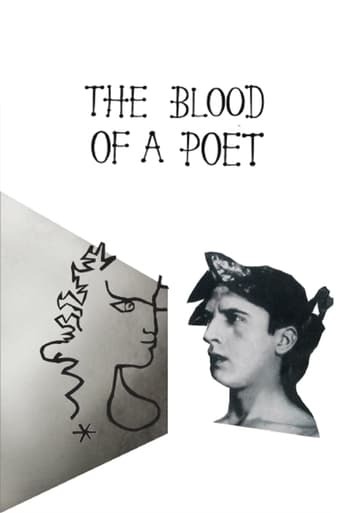whale_eyes
Spoiler Alert -- This appeared to portray a young man's suppression of his own sexuality.I was instantly sucked in to the exploration of his own identity.Standing half-nude, drawing a portrait of himself.Being sucked into a mirror (himself).Delving into bizarrely imaged fragments of his past.The scene with all the young boys fighting.The death of his true self.The emergence of a statue, immortal. Which was portrayed as a woman.-- This is what I grasped from the movie.I highly recommend, if you are into surrealism.10/10
tomgillespie2002
Jean Cocteau was a French poet, painter, playwright, actor, as well as film maker, and was a huge part of the artistic community at the time. The Blood of a Poet (to use its English translation), is a very personal piece of avant-garde cinema, that reflects the ideas of the artist, and presented in a disjointed, surreal style, that is an enigma, even on viewing a second time.The Blood of a Poet has four sections that seem to have no connection at all. We begin with Enrique Rivero as "the poet", who paints a face who's mouth begins to move. After erasing it with his hand, the mouth transfers to him. After pleasuring himself with the mouthed hand, the poet transfers it to a female statue, who orders him to climb through a mirror, where he enters a new realm, one that holds doors into which the poet views some strange scenes. In another sequence a boy is killed in a snow ball fight.The Blood of a Poet was the first in what became Cocteau's Orphic Trilogy, which continued with Orphee (1950) and Le Testament d'Orphee (1960). It's slow, poetic movements through some very beautiful imagery, are in themselves interesting at times. The film is practically silent, except that there is a partial narrative (that incidentally is far too poetically esoteric that we get no indication of what is happening).The film begins with a title card that states; "Every film is a coat of arms. It must be deciphered." This seems to be its intention, to be such a piece of art that its meaning requires unravelling. Whilst this kind of riddle is often pleasurable, in this cause it seems that you may need to know much about Cocteau himself - I have only read one biography of the man. Although, his film work does improve; the other two in the Orphic trilogy are splendid, along with his incredibly poet, and dreamily beautiful adaptation La Belle et la Bete (1946).www.the-wrath-of-blog.blogspot.com
Michael_Elliott
Blood of a Poet, The (1930) *** (out of 4) The first film in director Jean Cocteau's "Orphic" trilogy is clearly a very personal film, which means that the director knows what it's about while the viewer simply has to guess what it means. There's not any "plot" to speak of but instead we're treated to just over 50-minutes worth of images ranging from snow ball fights to a man shooting himself to countless other images, which are supposed to be taking part during the time it takes for a chimney to fall to the ground. There's no question that this film is full of surreal images and many people are going to watch this film and see nothing more than a lot of images thrown together without any rhyme or reason as to why they're being shown. I'm sure some people would like to unlock the mysteries behind the stories and will rack their brains trying to figure out what the director meant by each frame in the picture. I personally never put too much into a film like this where it's clear the director doesn't want to viewer to know what's going on. I'm sure Cocteau could explain each second of this film in full detail but as a viewer I really wasn't trying to figure out what was going on but instead just sit back and enjoy what I was seeing. I thought the first forty-minutes of this movie was extremely entertaining with many of the images really jumping out of me. My favorite sequence was the one where a man is ordered to put a gun to his temple and pull the trigger. What happens next is something I won't spoil in detail but the aftermath of the gunshot was quite creative. Another nice scene is when an artist goes "into" a mirror only to splash into some water instead. Many of these early images are shown in a wide range of ways and this really adds to the surreal nature of the picture. The final ten-minutes or so is where I started to get bored as the final act didn't strike me as being nearly as well-made or interesting. I wouldn't rank this film as a masterpiece and I wouldn't rank it up against the work of Luis Bunuel but on its own it's still a rather impressive little film but, again, I wouldn't try figuring it out.
Rindiana
While Bunuel's bitingly critical and ironically distanced surrealism is masterful in its own right, Cocteau opts for a highly personal, self-reflexive, distinctly poetic way to entrance the viewer's subconscious.To grasp concrete meaning while watching this beautiful fleeting cinematic poem would be as futile as hammering a nail into a drop of water. Surely, its main concern is the fragile and, to be honest, quite vain self-image of the artist in a material world with all its obstacles. But closer interpretations wouldn't befit an enigmatic pic as this.9 out of 10 collapsing chimneys

